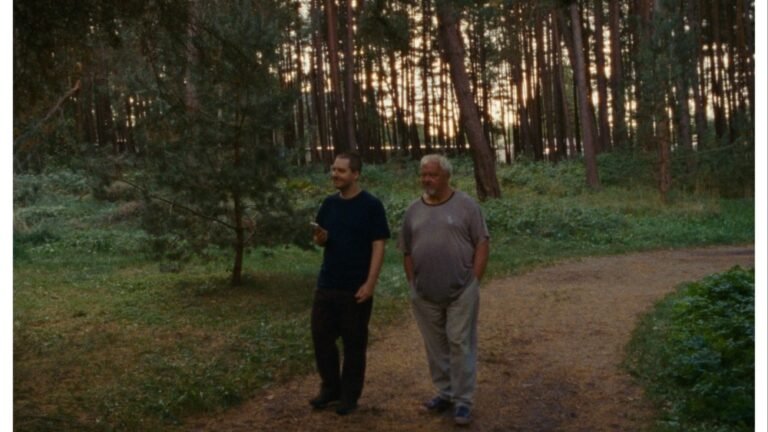You can’t go home again, as Thomas Wolfe famously told us, and the drifting, dawdling protagonist of “The Visitor” knows it all too well. But he goes home anyway, and stays there, and stays there, long outstaying a welcome that nobody especially offered in the first place, quietly revelling in his own foiled nostalgia. Back in his adopted country, a young family awaits his return, not all that impatiently. Over a balmy, slowly dissipating summer, nothing really pushes or pulls our aimless hero in either direction, and in this state of happy stagnation, melancholy becomes a comfort blanket. Some viewers will relate to the personal limbo depicted in Lithuanian director Vytautas Katkus‘ leisurely, unusual comedy; more may find it utterly confounding, but its breezy-sad charms should carry across that empathy gap.
An accomplished shorts director with Cannes and Venice competition entries under his belt, Katkus isn’t overly concerned with scaling up in his first feature-length effort. “The Visitor” has the intimacy of focus and tacit specificity of feeling that often marks a great short, over a sparse narrative nonchalantly extended to nearly two hours. That it feels languid — albeit not overstretched — is by thematic design in a story expressly about one man’s dogged attempt to more or less halt the passage of time, both futilely and with more initial success than might be expected. The film requires niche distributors (and viewers) attuned to its unhurried gait and beguilingly odd humor, but its profile will be lifted by a competition berth in Karlovy Vary, along with a rising tide in recent Lithuanian cinema that has also benefited festival successes like “Drowning Dry,” “Toxic” and 2023 Sundance winner “Slow.”
Indeed, “Drowning Dry” director Laurynas Bareisa is responsible for “The Visitor’s” deceptively intricate editing, while “Slow” director Marija Kavtaradze takes a co-writing credit. The resulting film shares with Bareisa’s breakout feature an unruffled ambiguity, and with Kavtaradze’s a supple ease of tone and construction — as well as a wistfully romantic outlook that here tilts incrementally away from naturalism into outright whimsy.
That pivot could irk viewers signed up for the low-key domestic realism of its opening scenes, which introduce 30-year-old Danielius (Darius Šilėnas, actually a moonlighting film editor) as he packs for an upcoming trip amid the general household disorder brought on by a new baby. A Lithuanian expat now settled in Norway with his Norwegian wife Rita (Hanne Mathisen Haga), he’s headed back to his homeland to sell his childhood apartment, presumably in the wake of a bereavement that is never precisely discussed.
Indeed, in Katkus and Kavtaradze’s teasing, allusive script, the details of Danielius’ past — and what took him from his sleepy coastal homeland to Scandinavia — emerge largely by omission, or oblique reflection in subplots that the film casually and sporadically strolls into. There’s clearly a lot of residual sorrow in the boxy, shabby apartment he returns to, though none that he now feels compelled to escape; the longer he stays there, tidying and emptying it for prospective buyers, the more contentedly he settles into the rhythms of a life he once lived.
Though he feels an awkward distance from old friends he encounters, his childhood neighbor Vismanté (Vismantė Ruzgaitė) acts as if he never left, calling on him to chat and to mind Puga, her large, shaggy sheepdog cross. Danielius, in turn, takes to hanging out with her taciturn but accommodating father (Arvydas Dapšys), pursuing a kind of paternal connection that has evidently been missing from his life for some time. And while he never exactly crosses paths with another resident of the apartment complex, gawky teenager Tomas (Rokas Siaurusaitis), Katkus’ attention wanders often enough to the youth and his lolling, sometimes lonesome days that we consider some manner of spiritual bond between the two.
Is it the panic of new fatherhood keeping Danielius in Lithuania longer than he needs to be? Does he miss the silence and loneliness that were once familiar to him, even as he seeks new attachments with a poignantly bare desperation? When a cheery young couple takes an interest in the apartment, he embraces their presence so eagerly, he seems loath to leave them to it — perhaps his old life within those tobacco-stained walls can overlap with their new one.
An accomplished cinematographer who shot last year’s Locarno competition champ, “Toxic” by director Saule Bliuvaite (who takes a cameo role here), Katkus assumes DP duties here too, veering away from that film’s hard digital aesthetic toward the warm, gauzy tactility of 16mm — apt enough for a story that rests heavily on semi-faded memories. Largely eschewing closeups, the filmmaker keeps the camera still and steadily watchful, each frame like a room in which characters slowly make themselves at home, finding familiar atmospheric cues.
“The Visitor” trades in conflicted, inchoate emotions that are more easily felt than articulated. But feel them we do, via surges and retreats in movement, mood and weather, fragments of conversation and karaoke floating in the late-summer air, or the tinny synths of Marvin Gaye’s “Sexual Healing” played over cramped cellphone speakers, eagerly starting a party with a scant handful of guests.
